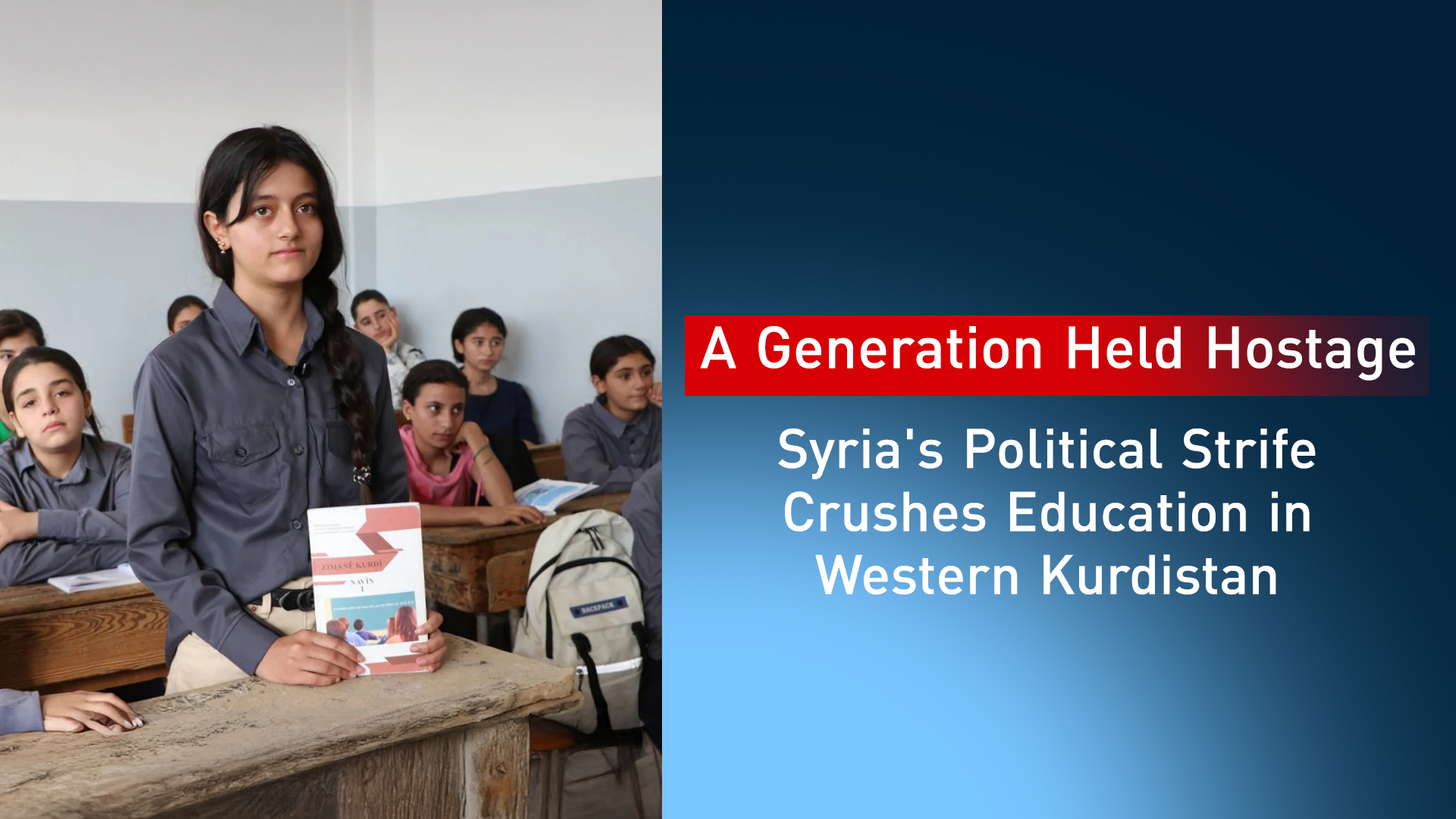A Generation Held Hostage: Syria's Political Strife Crushes Education in Western Kurdistan
Political disputes between Damascus and Kurdish-led administration crush education in Western Kurdistan, with 9&12th-grade pass rates dropped. Kurdish students face discrimination and systemic barriers despite some achieving top national scores.

ERBIL (Kurdistan24) – Mounting political disputes between Damascus and the Democratic Autonomous Administration of North and East Syria (DAANES) have cast a heavy shadow over the education sector, with alarming exam results fueling deep anxiety among students and families in Western Kurdistan. At the same time, Kurdish students have achieved historic national successes, even as others recount severe discrimination and systemic obstacles during Syria’s critical baccalaureate examinations.
According to official figures, the success rate for ninth-grade students dropped to 49 percent, the lowest in Syria in a decade. While baccalaureate results (12th grade) showed a relatively higher 75 percent pass rate, the number of students achieving grades above 90 percent fell significantly compared to previous years, signaling a decline in overall academic standards and preparation.
Families across Western Kurdistan expressed grave concern that unresolved political disputes between Damascus and the Autonomous Administration were depriving children of a secure educational future.
One of Western Kurdistan’s top performers, who achieved nearly 99 percent, told Kurdistan24 that the entire year was overshadowed by uncertainty. “The continuous changes in exam procedures and political disputes created unbearable stress. Many of us had to travel to other governorates for exams, imposing huge emotional and financial burdens on our families,” the student said.
Teachers also voiced alarm, pointing out that despite decent overall pass rates in the baccalaureate, the number of students meeting university entry thresholds declined. They cited fragmented curricula, frequent regulatory changes, and the lack of recognition for DAANES-issued diplomas as key factors undermining academic quality.
Beyond political disputes, some Kurdish students have reported being targeted by discrimination inside examination centers. Aljin Jawish, a Kurdish student from Afrin’s Rajo district, shared her painful experience with Kurdistan24 after attempting to sit for her final exam at the Port Said examination center in Aleppo.
“I had broken my hand just one day before the exam, and I came with a medical report and my arm in a cast,” Jawish said. “I requested assistance to have a supervisor write my answers. At first, the administration agreed. But inside the exam hall, I was insulted and humiliated because I am Kurdish. One monitor called me ‘Qasadiya’ just because I am from Sheikh Maqsoud.”
She explained that the substitute monitor assigned to write her answers deliberately failed to transcribe all her responses. “She ignored parts of what I said, claiming she was too busy, and in the end the exam was incomplete. When I tried to raise this with the administration, they dismissed me, saying I was lying. Now, because of this racist treatment, I may lose my dream of becoming a doctor like my father, despite being among the top students.”
Jawish added that her family had not filed a formal complaint, saying they did not know where to turn. “When we spoke with the exam administration, they accused us of fabrication. Later, the Afrin district director contacted us, saying he would send a car to take us to meet him, but nothing has been resolved.”
She appealed directly to authorities: “I call on the Minister of Education and the Syrian educational institutions to open an investigation and deliver justice. Examination halls should be neutral and safe spaces, not places of discrimination.”
Her testimony reflects growing fears of a systematic attempt to marginalize Kurdish students, compounding the structural barriers already posed by political and institutional disputes.
Extraordinary Kurdish achievements
Yet despite political barriers and discrimination, Kurdish students have reached unprecedented heights. Sarah Faeq Mohammed, from Afrin’s Jilbrin village, achieved a perfect 240/240 in the scientific stream, ranking first nationwide in Syria’s baccalaureate.
Other Kurdish high achievers included Jwana Ali from Qamishlo, who scored 237.7/240, and Hoshyar Qadi Khalil from Afrin’s Qarmitlaq village, who earned 239/240 in the scientific stream.
These results underline both the resilience of Kurdish students and the paradox of a system where political crises and discrimination coexist with outstanding individual achievement.
The education turmoil stems from years of unresolved conflict. DAANES implemented its own curricula, which remain unrecognized by Damascus. On 27 Mar. 2025, DAANES announced a UNICEF-brokered agreement with the Ministry of Education to allow students from its territories to sit exams in government schools. An electronic registration system was also launched.
This followed the historic March 11 agreement between Syria’s transitional President Ahmad al-Sharaa and SDF Commander Mazloum Abdi, aiming to merge DAANES structures into the Syrian state. Still, practical divisions in curricula and recognition persist, leaving students trapped between two systems.
In March, Mohammad Abdulrahman Terko, a Kurdish legal scholar from Afrin, was appointed Minister of Education. His selection was seen as a symbolic gesture toward Kurdish inclusion, but entrenched problems in exam administration and recognition remain unresolved.
With pass rates collapsing, reports of racism in exam centers, and thousands of students forced to travel for accredited diplomas, many families say their children’s futures are hostage to politics.
“Our children’s future is not in their hands anymore. It is in the hands of politicians,” one parent told Kurdistan24.
The story of Syria’s education today is one of contrasts: a generation burdened by political disputes, systemic discrimination, and declining standards, yet also capable of producing the brightest academic achievements in the nation. Whether these achievements will be nurtured or lost depends on whether Syria’s transitional authorities can secure fairness, recognition, and justice in education.